The Journals of Ayn Rand Read online
Page 36
Chapter II is extremely confused. The material is out of sequence and covers too many fields too soon.
Chapter III
Excellent in thought, but not definite in statement and much too soon in sequence. I take virtues for granted, instead of proving that they are virtues. Since it draws parallels between egoism and altruism, it must come later, after both have been stated, defined, and analyzed.
For Chapter I
Man’s sole means of survival is the rational faculty. It is a spiritual faculty through which he controls matter. Yet he has excluded it from his spiritual field—and does his damnedest to find himself excuses to be set free of it. (Man screaming against his own greatness.) He doesn’t want to realize that he himself must be controlled by the same faculty—and by himself. He dreads the responsibility. He wants the license of chaos within himself. What for? (“It’s such a big responsibility really to desire something.”)
June 30, 1945
General Notes
Be very careful to keep in mind that the axiom of your morality is not “Man must survive,” but: “Man must survive as man.” This is the crucial point; otherwise it becomes an issue of any kind of survival, and any criminal moron can claim that he is moral when he murders, because that is his only means of survival. This point, clarified, must cover such cases as when a man chooses to die, rather than compromise with evil. Since man’s status as man is within his own keeping (and he is the only such creature, that is his crucial distinction), the basis of his morality is the preservation of himself as man, not just the preservation of a physical hulk (which, incidentally, cannot be preserved without the preservation of his human spirit).
A possibly helpful point toward a clear definition of what constitutes one’s own judgment and what is merely taken on second-hand authority: an independent rational judgment is one which we know how to apply to the concrete. Every statement or judgment is an abstraction; when we repeat an abstract statement with no clear idea of its concrete application, we are [being] intellectually second-handed; we destroy our connection with reality and our sole means of handling it—the very fact of our consciousness.
It is useless to accept generalities second-hand, i.e., on the authority of others, because generalities are of no value except when and as applied to the concrete, and each man must do that for himself, applying principles to the concrete events of his life. He cannot do it with a principle he has not understood.
Man has a right (and a moral duty) to state the terms of his existence (again, since his nature is in his own keeping). At a certain point, he must tell his brothers: “This is the kind of existence I do not accept.” At that point, he [may] face a firing squad rather than submit to others. Think this point over carefully: it leads to an extremely important fact—that morality is not social, but in certain respects anti-social. Morality is unsocial in essence: it applies to and proceeds from man, not society. But when it involves man’s relation to other men, it becomes anti-social; it is man’s protection against society. (“Rights were not given to man by society nor for society, but against society. They are man’s protection against all other men.”) And, incidentally, only when each man is thus protected can one have a good society. Let society always remain what it is—a consequence, not a determinant, an effect, not a cause, the secondary, not the primary.
July 3, 1945
Nail down—thoroughly, completely, once and for all—the fool idea that good is merely a matter of good will or good intentions. Here’s another abstraction without relation to the concrete—a “floating abstraction.” [AR’s first written use of this expression.] Before you can have “good will,” i.e., before you can want to do good, you must know what is the good. In effect, fools say that all the problems, personal and political, can be solved by finding “men of good will.” But the “good” is never defined. And actually, most of the evil in this world is done by and through “good” intentions. The cause of evil is stupidity, not malice. “Good” is an intellectual concept.
Regarding the golden rule: “Do unto others as you’d want them to do unto you.” This is used in support of altruism. In that way, it would imply that you must give out to charity because you want to be an object of charity yourself. Or—you must sacrifice yourself to others because you want them to sacrifice themselves to you. Actually, the golden rule can work only in application to my morality: you do not sacrifice yourself to others and you do not wish them to sacrifice themselves to you. You may want to be helped in an emergency or a catastrophe—but only in such cases. You consider such cases a calamity—not your normal and proper state of existence. You do not wish to live as an object of charity—and you do not hand charity out to others.
July 5, 1945
General Plan Part I: Morality
1. The nature, necessity, and axiom of morality. (Morality must be practical.)
2. Define the morality of egoism.
3. Define the morality of altruism.
4. Virtues—under both moralities.
5. Human relations (personal, economic, political)—under both moralities.
6. Conclusion—the spiritual wreckage and corruption caused by altruism. The spiritual status of an egoist.
Part II: Politics
The reference of political forms and ideas to morality—and to both systems of morals.
Blast—once and for all—the horrible notion that love is in the nature of a handout, that it’s alms, charity, something undeserved but handed down out of generosity or pity. This idea leads to the impossible precept of loving everybody. If love is undeserved, one can love everybody; then, the less the object deserves it, the nobler is the love, since it makes the one who loves more generous. Therefore, the noblest emotion would be, not to love a Roark, but to love the lowest, vilest, most contemptible moron one could find. This has been actually preached. Yet, in common sense, people do not love that way.
Love is exception-making and it must be deserved. This means [it must be] an exchange—the one who loves gets a personal, selfish happiness out of the virtues or qualities he admires in the object of his love, and love is his payment for them.
It is the idea of love as alms that leads to the idea of parents’ love for their children as a generous sacrifice. But if the parents get no happiness out of their love for their children—their sacrifice is of no use and they’re vicious parents (other things being normal). If they do get personal happiness and their love is authentic, they’d better stop prattling about self-sacrifice.
When society makes claims on the individual—the individual also starts making claims on society (such as “my right to a beautiful street”). Then no untangling [of “rights”] and no justice is possible. The ultimate recourse is brute force. Without individual rights, no peace among men is possible. By herding men into “unity,” one creates total disunity and chaos. Instead of peace, one gets war of all against all, and general hatred.
July 6, 1945
The contradiction in the collectivists’ view of mankind: They hate mankind and believe that men cannot rule themselves for their own good, [because of] malice or stupidity or both. Yet they advocate giving total power to this vicious, incompetent majority. This is where the idea of a Nazi elite comes in—fuhrers ruling others for the others’ own good.
Every collectivist hates mankind because he hates himself.
The collectivists have such a tender concern for the dregs of humanity. What is their attitude toward humanity’s heroes?
July 8, 1945
For morality as non-social: it is most important (and hardest) to be honest with oneself. The person who lies to himself is much more revolting and corrupt than one who lies to others.
Why is the word “virtue” used as a synonym for “strength” or “effi cacy” ? There is here the same connection as between “right” used for “true to facts” and for “morally correct.” Obviously, the conceptions of morals and virtues were [meant] to be practical—not the complete opposite of practice. Altruism made them this last.
There is also the question: practical for whom? If ethics had always been considered as a social matter and based on collectivism—obviously the “good” and the “virtues” were set to profit collectivism, to work for the collective (for society). But collectivism doesn’t work. Therefore, the ethics of collectivism didn’t and couldn’t work. Men had to live as individuals—at least partially—in order to survive at all. Thus ethics and “ideals” became the impractical, the impossible. Thus all beauty, dignity, and inspiration were taken out of men’s actual lives. Men functioned on the conviction that their actual existence and their deepest reality were vicious, depraved, contrary to all ideals. And every attempt to reach the ideal resulted in suffering, horror, and evil.
No, ethics are not set arbitrarily, with some utilitarian purpose in view (as the dialectic materialists may claim at this point); that is, ethics are not relative, set “pragmatically.” No, we cannot have: “bourgeois ethics,” “capitalist ethics,” “collectivist ethics”—for the sake of a class, a state or any other “sake.” Ethics are absolute and objective. They must be based—not on an arbitrarily chosen purpose—but on the very nature of man. And the nature of man is individualistic. And the only ethics that will work are the ethics of individualism.
In ethics, when we ask the question: Practical for whom? Good for whom? we must give a reason for the answer. Good for the collective? Why? No reason can be given. Good for the individual? Why? Here there is a reason and an unanswerable one: because such is man’s nature.
Account for the fact that man is not “a social animal.” Explain the facts [regarding] human affection and loneliness.
Men have always thought—for some reason (think this out)—that morality must be difficult. The m
orality of egoism is much—oh, much!—more difficult than that of altruism (if difficulty is any relevant criterion at all). But it works.
Altruism works like every cheap [fraud]—by blaming the victim. As a spiritualistic medium tells you that your “vibrations are wrong” if you see nothing in his demonstrations, altruism tells you that it’s you who’re evil if you end up in a sea of blood by following consistently the dogma of altruism.
July 9, 1945
Even though men have been commanded to love their neighbors—they feel no love when facing a neighbor; they feel only an immediate sense of guilt: “I should love this man, but I don’t. I’m no good.” An emotion cannot be achieved by command—only by rational conviction. The acceptance of arbitrary authority is so counter-rational and, therefore, so counter to human nature that men cannot force themselves to make it a conviction. Even though Christ commanded men to love their neighbors and men have accepted the idea that Christ is God-like and, therefore, right—they still cannot experience an emotion on the basis of: “I don’t know any reason for it, but Christ told me so, therefore it must be right.”
Emotion can come only from actual rational conviction.
If men say that their emotions are a chaotic, contradictory mess—well, look at their convictions. They have none—or, to be exact, they have a grab-bag of undigested, unapplied, contradictory generalities, acquired at random, without volition, choice or examination. The state of their emotions is the result. A mess can produce only a mess. If you treat your mind like a garbage can, a recipient for any chance refuse, then your emotions will be garbage—useless, disconnected hunks of a little bit of everything, leading to nothing but decomposition, rot, suffering. Mental activity is the production and emotions are the consumption of your spirit; you have nothing but garbage to consume when you have produced nothing but garbage.
July 13, 1945
The moral man is not necessarily the most intelligent, but the one who independently exercises such intelligence as he has. He is not the man who has, potentially, the greatest brain power (if this can even be measured or determined), but the one who exercises his own brain power independently. Thus, a college professor who makes the intellectual error of collectivism or second-handedness somewhere in his thinking turns out in his theory and practice to be a vicious man (same with criminals, dictators, social reformers). But a plain man concerned only with his own life and his own job, not venturing beyond the limits of his own intellectual capacity, is usually a moral man in every sense. Therefore, the moral faculty is not something independent of the rational faculty, but directly connected with it and proceeding from it. The moral faculty, however, is not dependent upon the amount of intelligence, but upon the proper exercise of intelligence-its exercise according to the rules its nature demands, independently. In other words, the intelligent man is the moral man if he acts as an intelligent man, i.e., in accordance with the nature of his rational faculty. (He has the choice not to act in accordance with his rational faculty. That is why ethical laws are necessary. The laws of any function are implicit in the function. But man must discover and formulate them.)
My greatest personal mistake is ever to allow a word or a moment that “doesn’t count,” i.e., that I do not refer to my own basic principles. Every word, every action, every moment counts.
(This is also the pattern on which everybody makes mistakes [or] becomes irrational—not relating their one action or one conviction to another.)
Why must man’s morality be that of individualism and egoism? Because otherwise the best is sacrificed to the worst. If we establish the virtues which a rational man needs in order to survive, and then say that the goal of his virtuous action must be service to those who do not have such virtues—we place virtues in the service of vice, we penalize virtue and give a reward to vice (or weakness). [In regard] to survival, the altruist formula would read: the man capable of survival must not make his own survival his goal, but the survival of the man incapable of survival. ([Note added later:] If he works for his own survival, he is vicious. He can justify it only by helping the unfit. If he doesn’t do so, he had no right to survive.)
If we refer to happiness or the enjoyment of life, the altruist formula would be: the man capable of achieving enjoyment or the means of enjoyment must not make his own enjoyment the goal—but the enjoyment of the man incapable of achieving it.
If we formulate a moral code, the man who lives up to its every provision is the perfect, ideal moral man. If then we formulate our ideal man and make him a servant of others—it comes to sacrificing or subordinating the perfect to the imperfect, the ideal to the corrupt.
If the ideal moral man is the mark at which we must aim—how can we wish to reach the ideal if, when we reach it, our life shall be sacrificed to our moral inferiors?
(Here the question of natural endowments enters—to be defined and covered.)
A moral code must be the code of man at his best—at his best in every way, including natural endowments, since these are desirable. A moral code is the code of establishing values. Desire (or purpose) establishes values.
Suppose we imagine a man with all the perfect natural attributes: intelligence, strength, talent, health, beauty—every conceivable natural qualification. He is then a perfect entity, an entity perfectly fitted for life. But how will he live? Life is action. He must decide on his own action, set his own purpose. His choice must be guided by the moral law—he must also be morally perfect. (Here again I need a definition of why man needs a moral law. Moral law is a code of good and evil. Whose good and evil? Man’s. What man? The most perfect man conceivable.)
Now if it is asked: but what about the imperfect man, since most of us are imperfect? We can act only on the basis of our degree of perfection, trying to approach perfection; we cannot live on the basis of our flaws. For instance, if we are sick, we must try to get well—we cannot base our life on being sick. If a man is incurable, e.g., blind, he cannot expect the healthy to live by the rules set for his blindness.
[Man‘s] actions and his observance of the moral law are up to him. The purpose of life is happiness—and if we adopt the morality of altruism, then the man most fitted for life has the least right to it (or to its enjoyment, to happiness). The more endowed he is, the less right he has to his own enjoyment. And the less endowed the moron is, the more right he has to enjoy himself and to demand the sacrifice of everyone else. This is the irrational paradox of altruism—and it is vicious, since it is irrational and unnatural. This is the process by which qualities (virtues) desirable in fact become undesirable in morality (and also desirable natural attributes are made undesirable). This is why virtue becomes impractical. Altruism is the morality of death and destruction (and it leads to death and destruction in practice) because it holds as desirable the opposite of the qualities needed for man’s survival, the qualities of life.
The ideal is composed of all the attributes which we consider desirable. Why, then, should the final goal and purpose of the desirable be the undesirable? Why should a genius serve the happiness of the moron? Why—as an example—should a beautiful woman give up her evening gown to an ugly one?
Here enters the differentiation between ideal and moral ideal. The moral code must be the code that is needed by and is fair to the best possible type of man born naturally: the most intelligent, the ablest, the healthiest, the most beautiful. The average, lesser man cannot be sacrificed to this code; the better man doesn’t need his sacrifice. But more than that, the lesser man also can live only by such a code—to the degree of his abilities—and his rewards will be commensurate with this. But if it is said: “What about the man who cannot live by such a code at all?” The answer is: “Then he cannot live at all—because this is the only code by which man can survive.” No man must survive at the expense of another man.

 Anthem
Anthem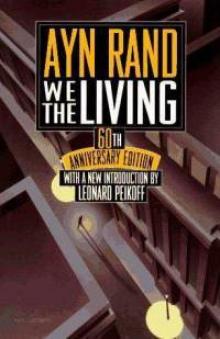 We the Living
We the Living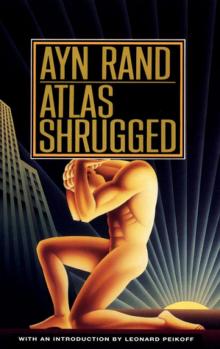 Atlas Shrugged
Atlas Shrugged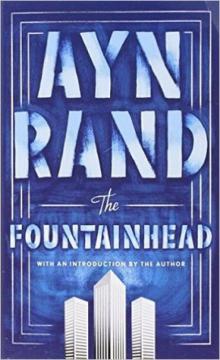 The Fountainhead
The Fountainhead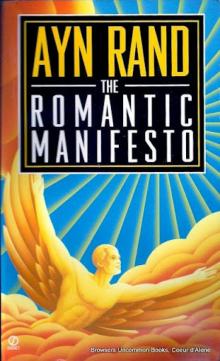 The Romantic Manifesto: A Philosophy of Literature
The Romantic Manifesto: A Philosophy of Literature The Classic Sci-Fi Collection
The Classic Sci-Fi Collection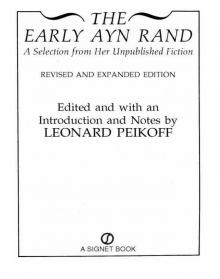 The Early Ayn Rand
The Early Ayn Rand